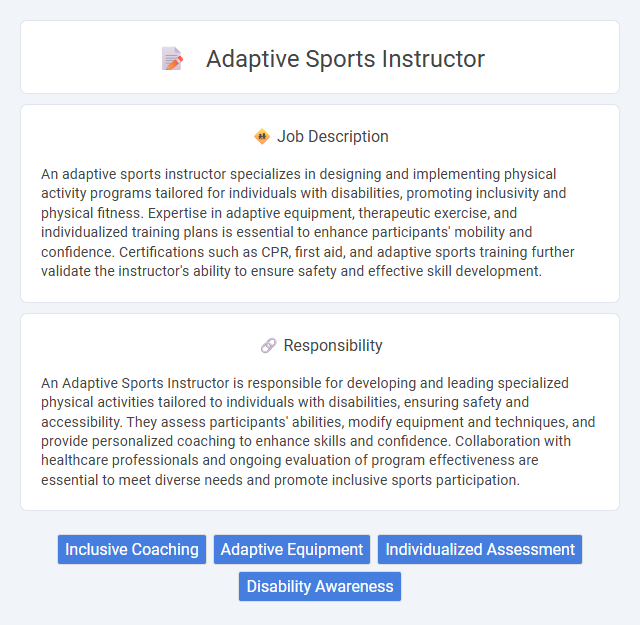
An adaptive sports instructor specializes in designing and implementing physical activity programs tailored for individuals with disabilities, promoting inclusivity and physical fitness. Expertise in adaptive equipment, therapeutic exercise, and individualized training plans is essential to enhance participants' mobility and confidence. Certifications such as CPR, first aid, and adaptive sports training further validate the instructor's ability to ensure safety and effective skill development.
Individuals with a strong passion for helping people with disabilities or physical challenges are likely suitable for an adaptive sports instructor role. Candidates who possess patience, excellent communication skills, and a deep understanding of adaptive techniques probably have a higher chance of success in this job. Those with limited empathy or difficulty working in physically demanding environments may find it less suitable.
Qualification
Adaptive sports instructors require specialized certification in adaptive physical education or therapeutic recreation, often including credentials from recognized organizations such as the National Center on Health, Physical Activity and Disability (NCHPAD). Proficiency in adaptive techniques for various disabilities, thorough knowledge of safety protocols, and CPR/First Aid certification are critical qualifications. Experience in working with diverse populations and the ability to design individualized sports programs to enhance participants' physical and social skills significantly enhance employability in this field.
Responsibility
An Adaptive Sports Instructor is responsible for developing and leading specialized physical activities tailored to individuals with disabilities, ensuring safety and accessibility. They assess participants' abilities, modify equipment and techniques, and provide personalized coaching to enhance skills and confidence. Collaboration with healthcare professionals and ongoing evaluation of program effectiveness are essential to meet diverse needs and promote inclusive sports participation.
Benefit
Adaptive sports instructors likely enhance physical and mental well-being by providing tailored activities for individuals with disabilities. These professionals probably promote inclusivity and boost confidence through personalized coaching. Their role may also contribute to improved social skills and community engagement for participants.
Challenge
An adaptive sports instructor likely faces the challenge of tailoring activities to meet the diverse physical and cognitive abilities of participants, requiring creative problem-solving skills. They may encounter unpredictable situations that demand quick adjustments to ensure safety and engagement. Balancing the need for inclusivity with competitive sport standards could frequently test their adaptability and patience.
Career Advancement
Adaptive sports instructors specializing in creating inclusive athletic programs for individuals with disabilities experience significant career advancement through certifications in adaptive physical education and specialized training in therapeutic recreation. Gaining expertise in assistive technology and rehabilitation techniques enhances opportunities for leadership roles, program development, and collaboration with healthcare professionals. Continuous professional development in adaptive sports methodologies and advocacy for accessibility contributes to increased responsibility and higher-level positions within sports organizations and rehabilitation centers.
Key Terms
Inclusive Coaching
Adaptive sports instructors specialize in inclusive coaching techniques that modify activities to accommodate athletes with disabilities, ensuring equal participation and skill development. They employ tailored strategies and assistive technologies to create accessible environments that foster confidence, teamwork, and physical fitness. Expertise in disability awareness and personalized communication is essential for promoting empowerment and safety in adaptive sports programs.
Adaptive Equipment
Adaptive sports instructors specialize in customizing and utilizing adaptive equipment to ensure athletes with disabilities participate safely and effectively. Their expertise includes fitting wheelchairs, prosthetics, and specialized gear tailored to individual needs, enhancing performance and comfort. Mastery of adaptive equipment technology is crucial for optimizing training programs and promoting inclusivity in diverse sports environments.
Individualized Assessment
Adaptive sports instructors conduct individualized assessments to evaluate each participant's physical abilities, limitations, and goals, ensuring tailored program development. These assessments encompass mobility, strength, coordination, and overall fitness to create safe and effective adaptive sports plans. Customized evaluations enhance participant engagement and progress by addressing unique needs and promoting skill development in adaptive athletic activities.
Disability Awareness
An Adaptive Sports Instructor specializes in creating inclusive athletic programs tailored to individuals with disabilities, promoting physical activity and social integration. They implement disability awareness techniques to modify equipment and coaching strategies, ensuring accessibility for participants with diverse needs. This role requires deep knowledge of various disabilities and adaptive methods to foster safe, empowering sports environments.
 kuljobs.com
kuljobs.com